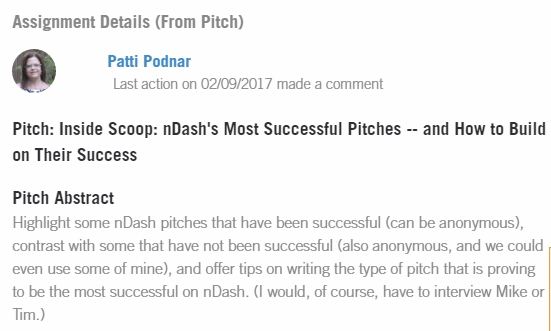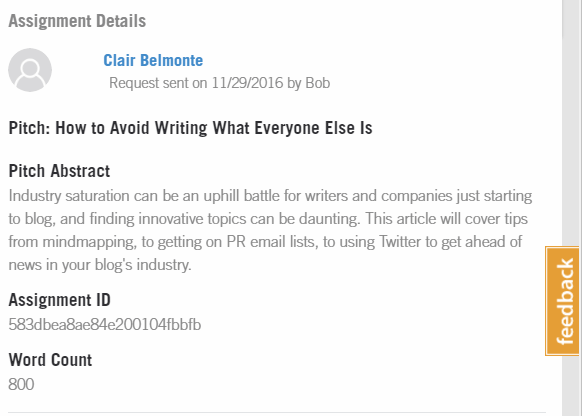 For writers who come to nDash from a journalism background, crafting the perfect pitch is a means of survival. If you don’t know how to write a good pitch, you don’t get paid. Do you fall into that trap? If so, learn more about the art of landing content creation gigs on nDash.
For writers who come to nDash from a journalism background, crafting the perfect pitch is a means of survival. If you don’t know how to write a good pitch, you don’t get paid. Do you fall into that trap? If so, learn more about the art of landing content creation gigs on nDash.
But for those of us who are coming at it from a corporate or marketing background, we can be tone deaf when it comes to finding the perfect pitch. We’re used to completing assignments, not coming up with them on our own. So even the best writers can be at a competitive disadvantage.
Let’s see if we can change that, shall we?
I asked nDash’s CEO Michael Brown to share some successful pitches so that we could analyze what made them so darn effective. He was kind enough to include one of mine, so let’s start there (then we’ll move on to the really good stuff!):
Pitch #1

To be perfectly honest, when I first came up with this idea, it was just a question I planned to ask Mike. I have 12 years of experience in corporate writing, and I’ve been running my own writing business for three years.
Before I started working with nDash, I had never written a pitch. I knew how to sell myself, but not a particular idea. But then, in a blinding glimpse of the obvious, I realized that other writers probably had the same questions. So I decided to turn it into a pitch. I could find answers to my questions while getting paid to do the work. What could be better than that, right?
In all seriousness, though…I knew it would appeal to the nDash audience since most of us are here to land writing assignments. Because of my struggles with pitches, I knew what questions to ask. I also knew that Mike would have the answers because he gets pitches every day. And I knew that, since nDash has a vested interest in happy, successful writers, it would be a win-win for everybody.
Pitch #2

I’ve been writing for this sector enough myself lately to know that it’s highly specialized, and it can take a newbie a while to get up to speed (I’m still learning). This writer acknowledged that right off the bat, which was a great way to establish both empathy and expertise. The rest of the pitch built on that knowledge, and he solidified his authority by taking a definitive stance: that, even though it’s not foolproof, infosec is vital.
In addition, Mike pointed out that the writer had obviously done his homework: his pitch was designed to align closely with this client’s previous posts and keywords.
Pitch #3

This writer clearly knows his stuff – that’s the price of entry when it comes to writing for the tech industry. But this pitch goes further than that. It’s more than just a teaser showcasing basic content creation. It’s a summary of what the article would be about.
This is important for two reasons. One, the brand can determine right away whether their audience would be interested in the topic. Two, they can also tell whether the angle would be in line with their business goals. This pitch worked because it eliminated the need for guesswork, making it easy for the brand to say yes.
Pitch #4

Again, this author clearly knows their stuff. And the reference to a recent report suggests that they’re in touch with what’s going on in the industry rather than just finding a statistic to cite.
What really struck me, though, was this sentence: “But the story here isn’t the destination; it’s the journey.” That lets the brand know that if they accept this pitch, they can expect some original thinking instead of just a recap of what everybody else has said.
Pitch #5

This writer starts her pitch with an emotional appeal – I doubt there’s a single person on nDash who can’t relate to the challenge of coming up with something new. Within any given industry, all of those different blogs can morph into one huge echo chamber. But, while the title sets the emotional hook, the writer makes it clear that this won’t be yet another post lamenting how hard it is to come up with good topics for business blogs. Instead, it’s going to be actionable, and she gives just enough detail to pique the brand’s curiosity.
Nobody wishes more than I do that there was some magic formula for writing the perfect pitch, but it’s just not that simple. And that’s both good and bad.
The good news is that other writers aren’t following some secret recipe no one told you about. The bad news is that you have to be as good at getting inside your audience’s head when writing pitches as you do when you’re writing the article itself.
What does a brand on nDash want from a blog post? It depends on the brand, but here are a few possibilities:
- To have a knock-your-socks-off, award-winning blog – without having to give it a lot of thought
- To not feel like they have to fact-check the writer
- To avoid being unpleasantly surprised with a blog post that’s not at all what they thought it would be
- To maintain the respect of their peers, competitors, customers, investors, etc.
In a nutshell, most brands would be thrilled if the blog-post fairy visited once or twice a week, posting perfect, engaging copy written specifically to accomplish their objectives. The closer your pitches come to delivering on that promise, the more likely they are to be accepted.
Great pitches tell your prospective client insight into your content creation process:
- Exactly what the post will be about
- That it will be better – more engaging, more original, more insightful, etc. – than anything their competitors are producing
- That your knowledge level is high enough that you won’t make them look bad
- That you’ve given the idea enough thought that you have sources in mind (and that said sources are reputable enough to not cause their competitors to point and snicker)
So when it comes to crafting the perfect pitch, try this:
Picture your prospective client sitting at their desk at the end of a long day. The voicemail light on their phone is blinking, their unread emails take up two whole pages, and their spouse wants them to get home and help with the kids (or maybe the dog needs to go out really bad!), and they’re hungry.
Here’s your content creation challenge: Write a pitch that will make their lives easier. Provide solutions, not just topic ideas. If you can give them one less thing to stay at their desk worrying about that night, you’ll have a winning pitch on your hands.
Ready to start on your content creation journey? Sign up or sign in to nDash now.